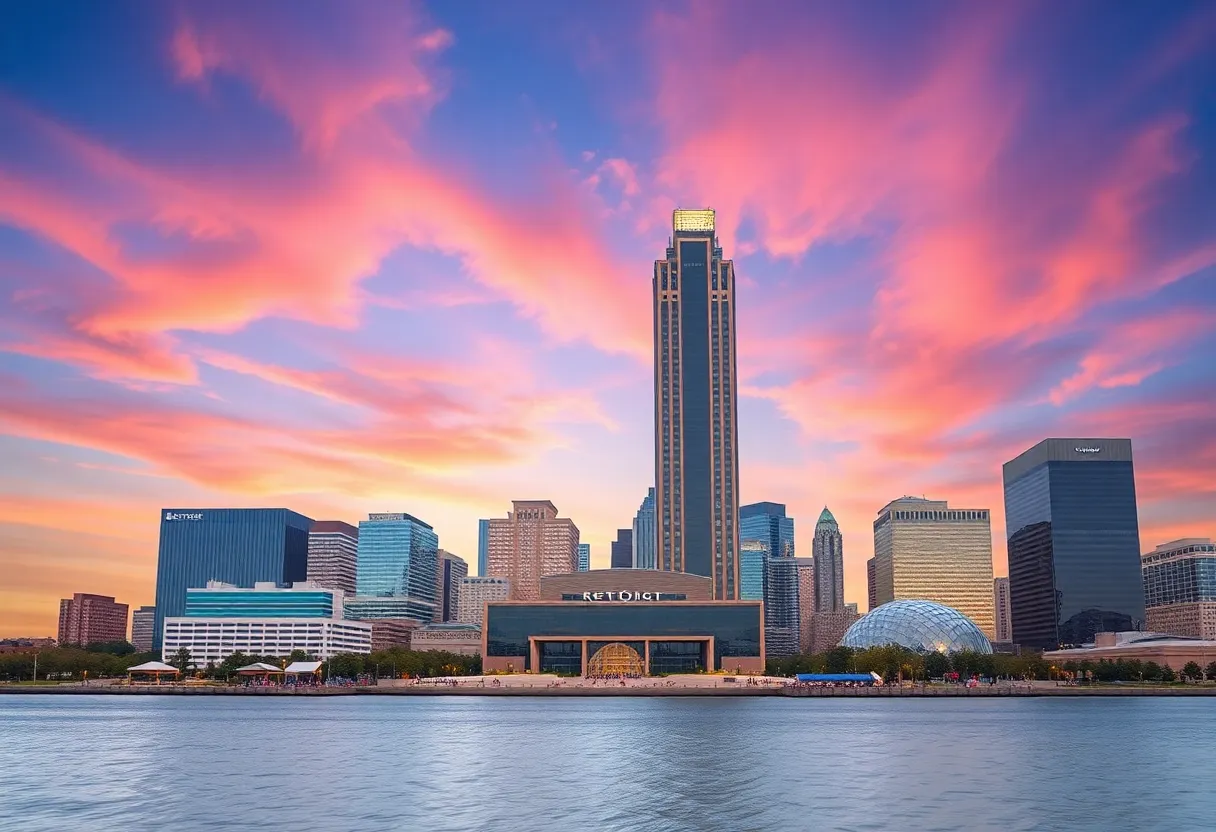News Summary
The Renaissance Center in Detroit faces a pivotal moment as preservationists, led by Preservation Detroit, rally against the planned demolition of key towers. This architectural marvel, symbolic of Detroit’s resilience, was built as part of the city’s revitalization. The ongoing debate centers around the need for modernization versus the importance of preserving the city’s historical and cultural identity, with advocates urging for adaptive reuse instead of demolition. As plans unfold, the city grapples with balancing redevelopment needs while maintaining its rich heritage.
Renaissance Center Faces a Pivotal Moment: Preservationists Rally Against Demolition
As Detroit looks towards the future, a spirited conversation is stirring around the iconic Renaissance Center, affectionately known as the RenCen. The city’s oldest preservation group, Preservation Detroit, is taking a stand against plans to demolish two of its towers, Tower 300 and Tower 400. This landmark, rich in civic and architectural significance, is back on the radar as debates about modernization and adaptability heat up.
A Treasure with Historical Roots
The RenCen is more than just another set of tall buildings; it stands as a symbol of Detroit’s sheer determination and resilience. Constructed as part of a revitalization effort following the events of the 1967 Uprising, this architectural masterpiece marked a new chapter for the Motor City, thanks to a dedicated coalition called “Detroit Renaissance.” Its towers, and especially the central structure, proudly boast the honor of being Michigan’s tallest building, soaring to an impressive 727 feet. The hotel tower, which opened in 1977, made headlines as the tallest hotel building in the world, showcasing incredible achievements in the city’s architectural landscape.
The Modernization Tug-of-War
So, where does that leave us today? Enter General Motors and Bedrock, who have big plans for the RenCen that include tearing down those two mentioned towers to redevelop the remaining structures into office, hotel, residential, and event spaces. They argue it’s time for a refresh, citing a staggering 70% vacancy rate that has left much of the complex underused. But preservationists are quick to point out the risks that come with demolition, emphasizing that such actions could deter potential revitalization efforts in the area, especially when the city faces existing shortages in housing and hotels.
The Call for Sustainability
One compelling argument from conservationists revolves around sustainability. Demolishing buildings doesn’t just erase the labor and energy invested in them, but it completely undermines the environmental principles that many cities strive to uphold. As a powerful alternative, advocates are passionately promoting adaptive reuse—a growing movement that emphasizes preserving and modernizing existing structures rather than resorting to demolition.
The Skyline’s Cultural Fabric
As the stakes rise, it’s worth noting that the Detroit City Council recently turned down a proposal to classify the Renaissance Center as a historic district amid ongoing redevelopment discussions. Council members voiced understandable concerns about how to maintain the city’s skyline and cultural identity while also addressing the urgent need for modern spaces. Many are eager to see if a balance can be struck that favors preservation. The right approach might create a revitalized skyline that gracefully coexists with Detroit’s rich historical tapestry.
What Lies Ahead?
Even as redevelopment plans swirl, it’s clear that some supporters believe this transformation could ultimately generate new jobs and enhance the riverfront landscape, opening up fresh opportunities for the community. While some Council members lean towards modernization, there are understandable fears about losing the historic essence that would follow the demolition of such iconic structures. There are concerns that pushing for historic designation could hinder redevelopment efforts, leaving those towers vacant and unproductive for years.
A Future Worth Fighting For
As these discussions unfold, it’s apparent that preservation advocates aren’t about to go down without a fight. They believe the waves of modernization can indeed harmonize with preservation efforts to create spaces that simultaneously honor Detroit’s vibrant past while addressing future demands. Merging innovation with heritage could lead to a city that cherishes its roots while embracing the opportunities the future holds.
So here we stand, with Detroit at this crucial crossroads. The question lingers: Will the Renaissance Center shine as a beacon of architectural foresight, or will it tell a cautionary tale of lost history? Only time will reveal the answer.
Deeper Dive: News & Info About This Topic
HERE Resources
Additional Resources
- Architectural Record
- CBS News
- Detroit Free Press
- Detroit News
- ClickOnDetroit
- Wikipedia: Renaissance Center
- Google Search: Renaissance Center Detroit
- Encyclopedia Britannica: Detroit
- Google News: Renaissance Center Detroit
- WRIF
Author: STAFF HERE NOVI WRITER
NOVI STAFF WRITER The NOVI STAFF WRITER represents the experienced team at HERENovi.com, your go-to source for actionable local news and information in Novi, Oakland County, and beyond. Specializing in "news you can use," we cover essential topics like product reviews for personal and business needs, local business directories, politics, real estate trends, neighborhood insights, and state news affecting the area—with deep expertise drawn from years of dedicated reporting and strong community input, including local press releases and business updates. We deliver top reporting on high-value events such as Motor City Comic Con, Michigan State Fair, and Novi Home and Garden Show. Our coverage extends to key organizations like the Novi Chamber of Commerce and Novi Community Foundation, plus leading businesses in automotive, technology, and manufacturing that power the local economy such as Gentherm, Stoneridge, and Daifuku North America. As part of the broader HERE network, including HEREDetroitMI.com, HEREGrandRapids.com, HERENorthville.com, and HEREPlymouth.com, we provide comprehensive, credible insights into Michigan's dynamic landscape.








